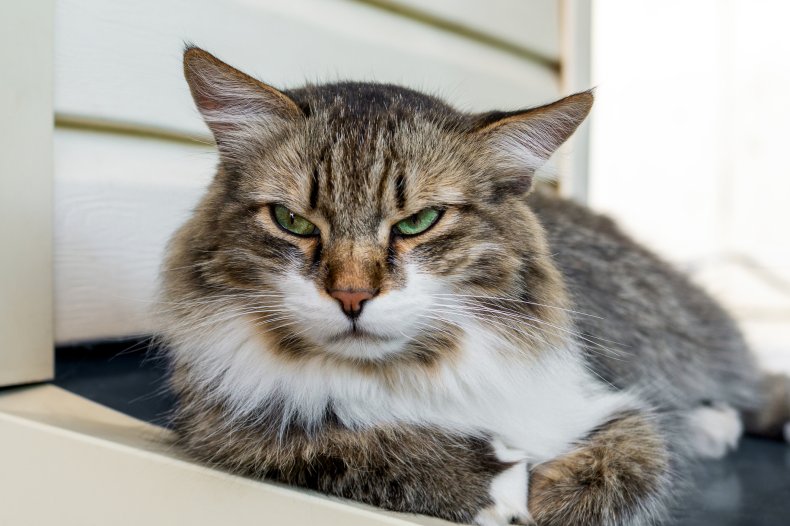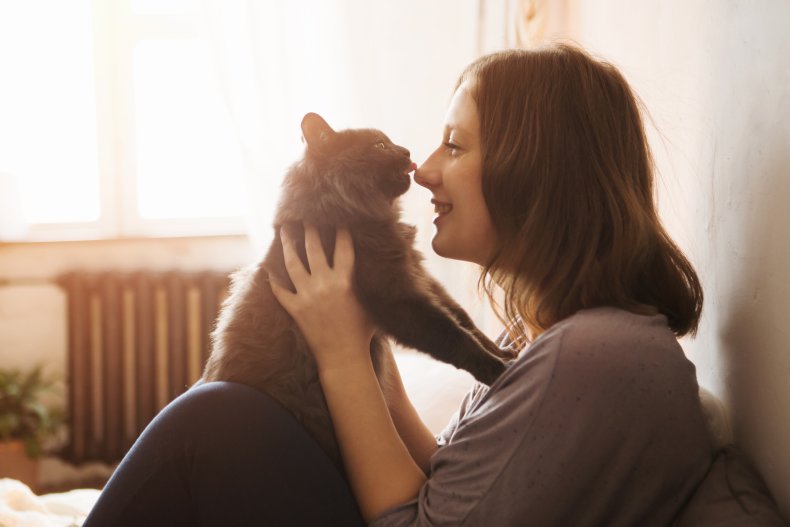Whether it's that look in their eye or the fact you've denied them treats for the fifth time, most owners have suspected their cat of harboring murderous intentions at one time or another.
Like humans, cats can feel a wide range of emotions—including fear, anxiety, anger, frustration and happiness. But while we may love our feline friends, most cat owners have no idea what's going on in their cat's head—for better or worse.
A 2019 study published in the journal Animal Welfare saw 6,000 people from 85 counties analyze feline facial expressions. The average score was 60 percent, with only 13 percent able to accurately read a cat's emotions.

"We unfortunately don't have a lot of information on the development of emotions in cats," Janet Cutler, cat behaviorist at cat-world.com, told Newsweek.
"But understanding cat emotions is important to provide for their needs and create a stronger bond."
So, what feelings do cats experience, and what steps can owners take to better understand their pet?
What Emotions Do Cats Feel?
Although research into feline cognition and communication is fairly new, studies have shown that cats feel basic emotions. However, more complex feelings, such as guilt or embarrassment, may be too difficult for cats to comprehend.
"Emotions that require an understanding of self or a concept of time are likely not felt—or at least not felt in the same way," Cutler said.
A cat's personality and behavior are also influenced by their past experiences.
"Experiences during development can have a huge influence on their emotions and resulting behavior later on in life," Cutler said.
"It's just as in humans, how siblings can react in different ways to situations."
"Behavior is the best way to begin to figure out the emotions your cat might be feeling."
Do Cats Feel Love?
Due to their independent nature, many owners wonder if their cat actually loves them, or just views them as a walking litter box cleaner.
Well, cat lovers will be pleased to know that our feline friends do feel love, with a 2020 study published in the journal Animals finding that cats are capable of forming deep bonds with humans.
According to Cutler, slow blinks, purring and a relaxed body posture are just a few ways to know if your cat cares about you.
How Can I Tell What My Cat is Feeling?
Until recently, there was very little research on cat cognition, due to the belief that felines are "untrainable" and tougher to study.
Although this is untrue, with cats able to learn commands and behaviors like any other animal, the lack of scientific investigation means they remain somewhat of a mystery to many owners.
It's also common for people to compare cat behavior to dogs. Not only has canine communication been more intensely studied than that of felines, but dogs have also been domesticated for much longer. This means that dogs have evolved facial changes to better communicate with humans, while felines do not have this advantage.
Nevertheless, cat owners can learn to read their pet's body language.
"Behavior is the best way to begin to figure out the emotions your cat might be feeling," said Cutler.
"By observing their body language in different situations, you can learn what your cat does when they experience certain emotions."
Here are a few ways to tell how your cat is feeling.

Scared or Anxious
If your cat is feeling fearful, they may have a crouched posture with their ears back (informally known as airplane ears or "nrooms") and their eyes will be wide. They may also hide in small, secure places.
Hiding is also a sign of anxiety, along with excessive grooming, a loss of appetite and urinating outside of the litter box. To solve the problem, owners must find and eliminate the source of stress or fear. If this isn't an option, there are things pet parents can do to make the situation easier for their cat.
Relaxed and Happy
A cat that is feeling comfortable and at ease will lie with their body spread out and their eyes partially closed. They will also likely purr, have dilated pupils and their ears will face forward (as opposed to backwards, as when stressed or afraid).
If your cat is in a good mood, they may also greet you with a high tail when you enter a room, or generally have a calm or playful demeanor.
Anger
Cats may be harder to read than dogs, but if you make your cat angry, you'll know about it. A furious cat's body will go rigid and their ears will sit flat against their head.
Their tail will either stand up straight or curl tightly against their body, while their fur will stand on end to make them appear bigger. They will move into a crouching position to seem more threatening, and you can expect hissing and growling—if they don't go silent and avoid you entirely.
The chart below, provided by Statista, shows where U.S. owners found their pets.
 You will find more infographics at Statista
You will find more infographics at StatistaRelieved
Whether it's a bout of "the zoomies" or returning home from a stressful vet trip, cats will often stretch to show their relief. Their body will also relax, moving into a calmer posture, and they may also yawn or groom themselves to release tension.
Frustrated
If your cat is feeling frustrated, they will turn their attention solely on the object of annoyance. It doesn't matter whether their toy is out of reach or you're ignoring them for the TV, you'll hear about it.
Look out for wide eyes, ears pointed forward and their whiskers spreading. They may also pace impatiently while yowling to get your attention.
Do you have funny and adorable videos or pictures of your pet you want to share? We want to see the best ones! Send them in to life@newsweek.com and they could appear on our site.








